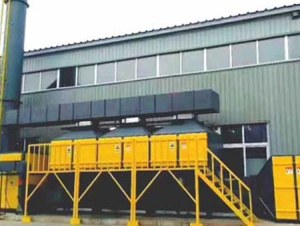Waste Gas Treatment Equipment
The waste gas treatment equipment consists of multiple activated carbon adsorbers and a catalytic burner (complemented by low-pressure fans, valves, etc.).
Exhaust gas is pretreated to remove dust and particulate matter, and then sent to activated carbon adsorber. Considering the amount of waste gas, the adsorption desorption bed of activated carbon adsorber adopts the principle of alternate desorption.
When the adsorption is close to saturation (pressure difference or concentration detection), close the exhaust gas inlet and outlet at both ends of the adsorption desorption bed (other multiple sets of continuous adsorption), open the desorption inlet and outlet, and then use the hot gas flow to desorb the desorption of the activated carbon adsorber to desorb organic matter from activated carbon.
In the desorption process, the organic waste gas has been concentrated, the concentration is increased by 3-10 times compared with the original, the concentrated waste gas is sent to the catalytic combustion device, and finally is decomposed and reacted into CO2 and H2O.
Waste Gas Treatment Equipment for Sale
Organic Waste Gas Adsorption Catalytic Purification Device
RTO Type Regenerative Thermal Incinerator
Organic Waste Gas Adsorption And Purification Device
Catalytic Purification Device For Organic Waste Gas
Three Types of Paint Shop Waste Gas Treatment Equipment
XMT has three types paint shop exhaust gas treatment equipment
1. Adsorption Concentration-desorption Desorption-catalytic Combustion.
After the desorption and desorption is completed, the adsorption and desorption bed I enters the standby state. When the adsorption and desorption bed II is close to saturation, the system automatically opens the adsorption and desorption bed I and desorption and desorption of the adsorption and desorption bed II.
After the desorption and desorption is completed, the adsorption and desorption bed II enters the standby state. When the adsorption and desorption bed III is close to saturation, the system automatically opens the adsorption and desorption bed II, and at the same time, the adsorption and desorption bed III is desorbed and desorbed. Follow this cycle.
When the concentration of organic waste gas reaches 2000-3000mg/m3, spontaneous combustion can be maintained in the catalytic bed without external heating. This solution not only greatly saves energy consumption, but also reduces the equipment investment because the catalytic burner's processing capacity only requires 1/10 of the original exhaust gas treatment capacity. Not only suitable for continuous work, but also suitable for intermittent work.
Due to the low ignition temperature, it is an ideal method for treating organic pollutants by catalytic reaction (no open flame). It has the advantages of wide application range, simple structure, high purification efficiency, energy saving, and no secondary pollution:
(1) The purification efficiency is high, which can be as high as 98% or more, to ensure that the exhaust gas meets environmental protection emission standards;
(2) Perform flameless combustion, set multiple safety facilities, and operate the equipment safely and reliably;
(3) Low ignition temperature, high heat exchange and heating efficiency, low energy consumption and low operating cost;
(4) The equipment layout is compact and the floor space is small, saving civil construction and installation costs, convenient operation and maintenance management, etc .
Incineration Adaptability
Incineration target: low-concentration (less than 500mg/m3) high-volume organic waste gas
Incineration occasions: printing and coating, food baking, chemical production, etc.
A single set of exhaust gas treatment capacity: 1000 ~ 500,000 Nm3/h
2. Rotating RTO (Regenerative Thermal Oxidizer)
The rotating RTO uses a fixed regenerator equipped with honeycomb ceramics. The exhaust gas changes the entry area of the exhaust gas under the switching of the rotary valve, so that the exhaust gas enters the regenerative chamber under controlled conditions, and uses the rotary valve to distinguish heat, store heat, and blow back a zone to achieve the purpose of fully decomposing and discarding.
Applicable Industry:
Chemical industry, organic waste gas from chemical synthesis process (such as ABS synthesis), organic waste gas from petroleum refining process, PTA tail gas treatment, automobile and machinery manufacturing industry, organic waste gas from paint coating line and drying room, electronics manufacturing industry, printed circuit board (PCB) Organic waste gas, electrical appliance manufacturing industry, enameled wire insulation organic waste gas, light industry, shoe-making glue waste gas, printing industry color printing waste gas, metallurgical steel carbon electrode production organic waste, other related industries.
Features:
1. Small footprint, 1/3 of ordinary three-room RTO
2. Rotary valve adopts air pressure seal
3. High processing efficiency, over 99%
4. Higher investment and higher maintenance cost than multi-room RTO
3. Rto Incinerator
Characteristics of regenerative thermal incinerator:
(1) Adopting regenerative heat exchange device, the regenerative carrier directly exchanges heat with the gas, the furnace radiant temperature and pressure are large, and the heating speed is fast; the low temperature heat exchange effect is effective, so the heat exchange efficiency is particularly high, and the maximum recovery of combustion products Waste heat; high thermal efficiency, low exhaust temperature, significant energy saving effect.
(2) Because the flame is not generated in the burner, but starts to burn gradually in the high temperature regenerator in the furnace, there is no high temperature front, so the combustion noise is low;
(3) The high-temperature flame combustion area is expanded, and the flame boundary almost extends to the boundary of the furnace, so that the temperature in the furnace is uniform, so that on the one hand, the purification efficiency is improved, and on the other hand, the furnace life is extended;
(4) The thermodynamic conditions of the rto incinerator are completely different from the traditional combustion process. The staged combustion technology is used to release the thermal energy under delayed combustion; the furnace temperature rises uniformly, the burning loss is low, and the heating effect is good. There is no longer the local high temperature in the traditional combustion process. The oxygen zone suppresses the generation of thermal nitrogen oxides (NOX), has a good environmental protection effect, and completely converts the carbon, hydrogen, and oxides in the exhaust gas into harmless substances such as CO2, H2O, and finally meets the standard emissions.
(5) The temperature in the combustion chamber rises as a whole and the distribution becomes more uniform; the furnace temperature can be as high as 850 ~ 1100 ℃, the air flow rate is large, the combustion speed is fast, the flue gas stays in the furnace at high temperature for a long time, and the organic matter is completely oxidized and decomposed. The environmental protection effect is remarkable;
(6) The exhaust gas inlet is provided with inert alumina ceramic balls to protect, buffer and filter the regenerative ceramics and prolong the service life of the regenerative ceramics.
(7) The three-way switching air valve adopts our company's unique structure, coupled with reliable sealing materials, and has the characteristics of rapid switching, not easy to wear, and long working life;
(8) The system adopts PLC automatic combustion control, with high degree of automation, stable operation and high safety and reliability;
(9) According to the situation of waste gas, a heat energy recovery device can be reasonably set, and a heat conduction oil furnace or a waste heat boiler can be connected to the high temperature combustion chamber.
Incineration Adaptability:
Incineration objects: organic waste gas, coating waste gas, malodorous waste gas and other organic waste gas with calorific value.
Incineration occasions:
The concentration of organic waste gas is high;
Large amount of organic waste gas treatment;
Printing, food processing, surface coating production, chemical engineering, electronics, etc.
Exhaust gas treatment capacity: 5000 ~ 200000 Nm3/h.
XMT is an experienced painting line manufacturer, we provide blasting machine, sandblasting machine, Waste water treatment equipment and etc. Want to know more? Please contact us.
Personne à contacter : Zhang Kathy , +19 9 75 01 85 88
Bonne affaire : acheter au vendeur
Nous vous invitons à lire nos conditions générales d'utilisations. Vous pouvez aussi vous rendre sur nos FAQ et consulter notre page d'informations sur les risques liés à la contrefaçon.
|
Cette page concerne les importateurs et exportateurs de Waste Gas Treatment Equipment Rechercher dans la catégorie : Biens d'équipement Rechercher dans la catégorie : treatment, waste, equipment |
Tuesday 04 June 2013
Quantité : 500 - Prix : 70,00 €
200 ensemble écran unité centrale IBM DELL HP en Pentium 4 HT – 40 Go DD – 512 Mo + ecran plat 17 pouces a 70 euro Windows installé 150 ensemble écran unité centrale IBM DELL HP en Pentium 4 HT – 80 Go DD – 1024 Mo + ecran...
ste md 26
- 75020 - Paris
- 06 12 41 17 35
Saturday 19 July 2025
Quantité : 100,000 pc
JBI is one of the leading professional screw manufacturers in Taiwan and specialized in manufacturing screws, bolts, nuts, washers, fittings, springs, and other hardware. All our products are produced according to the IFI, DIN, ISO International standard specification. Our fasteners...
Jeng Bright International Corporation
- jbitwco
- 830 - Kaohsiung City
- +88 6 77 02 10 77
Saturday 19 July 2025
Quantité : 100,000 pc
JBI is one of the leading professional screw manufacturers in Taiwan and specialized in manufacturing screws, bolts, nuts, washers, fittings, springs, and other hardware. All our products are produced according to the IFI, DIN, ISO International standard specification. Our fasteners...
Jeng Bright International Corporation
- jbitwco
- 830 - Kaohsiung City
- +88 6 77 02 10 77
Paiement sécurisé











